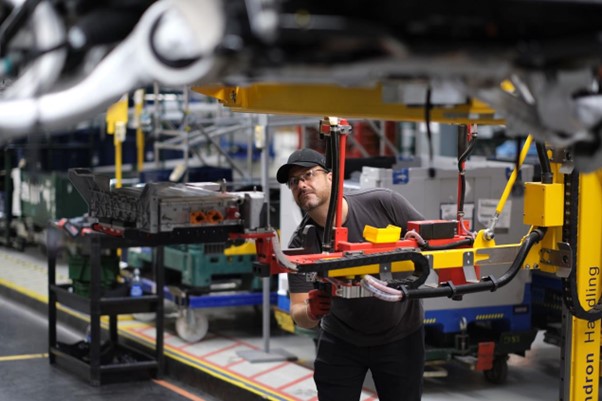The Government has ruled out weakening electric vehicle (EV) production targets for car and van makers despite mounting pressure from the industry.
The Department for Transport (DfT) has introduced a Zero Emissions Vehicle (ZEV) mandate, requiring more than a fifth (22%) of cars and 10% of vans sold by manufacturers to be electric this year.
The mandate becomes tougher each year ahead of a complete ban on the sale of new diesel and petrol cars expected to be from 2030, instead of the 2035 end date introduced by the last Government.
Manufacturers will face fines of £15,000 for each vehicle sold outside the target, but the reality of the targets is not as clear-cut as this, as there are several alternative ways for manufacturers to meet compliance.
These are intended to mitigate risks associated with product investment cycles and uncertainty regarding sales volumes.
Ministers are holding crunch talks with manufacturers with factories in the UK this week, starting with Nissan today (Monday, November 18).
Speaking to LBC yesterday (Sunday, November 17), transport secretary Louise Haigh said that she will look at “flexibilities”, but insisted that “the mandate will not be weakened”.
She added: “There has been a downturn in demand on a global level, so we are absolutely in listening mode.
“We want to discuss how the current situation is affecting them, but we are not diluting our ambition.
“I’m meeting with Nissan tomorrow and the business secretary, the energy minister and I are meeting with a number of automotive manufacturers later in the week in order to discuss the challenges that they face on a global scale.”
While almost 300,000 new EVs have reached the road in 2024, trade body the Society of Motor Manufacturers and Traders (SMMT) says this represents 18.1% of the market – an increase on 2023, but still significantly short of the 22% target for this year and the 28% which must be achieved in 2025 under the ZEV Mandate.
Meanwhile, fully electric vans currently account for a 5.6% market share – significantly below the 10% required by year end.
Stellantis has previously threatened to stop producing vehicles in the UK within a year, if the Government did not take action to stimulate demand for EVs.
Speaking at a Society of Motor Manufacturers and Traders (SMMT) conference in June, Stellantis UK head Maria Grazia Davino said the business will evaluate alternative locations for production if the UK market becomes “hostile”.
Unite has demanded Stellantis commit to the future of both Luton and Ellesmere Port.
The union said that its members at Luton have delivered on every target that has been asked of them to prepare the plant to start production of EVs in 2025. Similarly, Ellesmere Port has already transitioned to full electric production.
Unite added it is “already having constructive discussions with Government and industry to reform the EV mandate to protect jobs”.
Peter Golding, managing director of FleetCheck, is hoping for a rethink on van targets in the ZEV mandate.
“Electric vans themselves tend to be around 50% more expensive than ICE equivalents and bring range and payload compromises that simply make them difficult to use for many fleets,” he said.
“Creating a home charging infrastructure for van drivers is proving more difficult than for cars while public chargers are expensive to use and, in some places, availability remains poor.
“The Government needs to recognise that these very real reasons are behind slow electric van adoption and provide inducements for businesses in much the same way that benefit in kind taxation advantages have powered widespread electric company car adoption.”
He added: “We know that the Government doesn’t have huge amounts of money to throw around and also that politically, it doesn’t tend to shy away from unpopular decisions, such as removing the winter fuel allowance.
“It would be easier for them to create disincentives for electric van use such as zero emissions zones for commercial vehicles, rather than incentives such as tax or purchasing gains.
“What the fleet sector needs to make clear is that we require help with solutions to the very real problems fleets are encountering when it comes to adoption. Gestures are not going to work at this point.”





















Login to comment
Comments
No comments have been made yet.